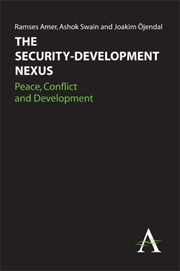Book contents
- Frontmatter
- Contents
- List of Tables and Figures
- List of Editors and Contributors
- Acknowledgements
- Chapter 1 Researching the Security-Development Nexus through a Multi-disciplinary Approach
- Chapter 2 Exploring the Security-Development Nexus
- Chapter 3 Liberal State-Building and Environmental Security: The International Community between Trade-Off and Carelessness
- Chapter 4 The Rising China and Maintaining the International Order: Some Reflections
- Chapter 5 Non-use of Force, Non-interference and Security: The Case of Pacific Asia
- Chapter 6 International Dimensions of Peace Processes in Aceh and Sri Lanka: The Role of Intermediaries in the 2000s
- Chapter 7 The Challenges of Human Security and Development in Central Asia
- Chapter 8 Diasporas' Role in Peacebuilding: The Case of the Vietnamese-Swedish Diaspora
- Chapter 9 Tracing Minerals, Creating Peace: The Security-Development Nexus in the DRC
- Chapter 10 Water Management and the Security-Development Nexus: The Governing of Life in eThekwini Municipality, South Africa
Chapter 4 - The Rising China and Maintaining the International Order: Some Reflections
Published online by Cambridge University Press: 05 June 2012
- Frontmatter
- Contents
- List of Tables and Figures
- List of Editors and Contributors
- Acknowledgements
- Chapter 1 Researching the Security-Development Nexus through a Multi-disciplinary Approach
- Chapter 2 Exploring the Security-Development Nexus
- Chapter 3 Liberal State-Building and Environmental Security: The International Community between Trade-Off and Carelessness
- Chapter 4 The Rising China and Maintaining the International Order: Some Reflections
- Chapter 5 Non-use of Force, Non-interference and Security: The Case of Pacific Asia
- Chapter 6 International Dimensions of Peace Processes in Aceh and Sri Lanka: The Role of Intermediaries in the 2000s
- Chapter 7 The Challenges of Human Security and Development in Central Asia
- Chapter 8 Diasporas' Role in Peacebuilding: The Case of the Vietnamese-Swedish Diaspora
- Chapter 9 Tracing Minerals, Creating Peace: The Security-Development Nexus in the DRC
- Chapter 10 Water Management and the Security-Development Nexus: The Governing of Life in eThekwini Municipality, South Africa
Summary
Introduction
With the rise of China, people around the world are wondering whether this rising power would change the existing international order, including the legal order. Economically, China is now one of the most significant trading countries, and its economy threatens to overtake the largest economy in the world (that of the US) in the not too distant future. Most importantly, its consistent two-digit growth rate in the last three decades has also made the Chinese economy the fastest-growing economy in the world. Since its accession to the World Trade Organization (WTO), its GDP has grown more than 10 per cent annually. China has also been one of the largest recipients of foreign direct investment (FDI) inflow for many years, and is certainly going to stay that way for many years to come. Demographically, China is the largest country in the world with a total population of over 1.3 billion. Politically, China is one of the five permanent members of the United Nations Security Council. It is common perception that the trend of China's ascendancy will continue well into the foreseeable future. The world political landscape will inevitably change in response to the rise of China, and so will the global order. Not surprisingly, it has been predicted that: ‘Asia will alter the rules of the globalizing process’ and ‘Asian giants may use the power of their markets to set industry standards, rather than adopting those promoted by Western nations or international standards bodies’ (National Intelligence Council 2004, 28).
- Type
- Chapter
- Information
- The Security-Development NexusPeace, Conflict and Development, pp. 65 - 88Publisher: Anthem PressPrint publication year: 2012



